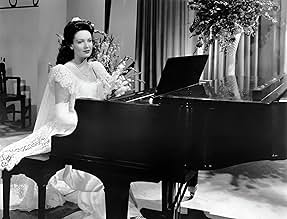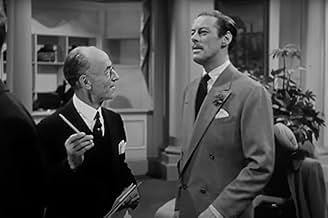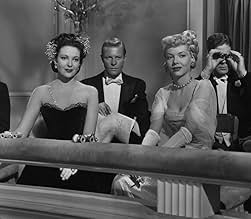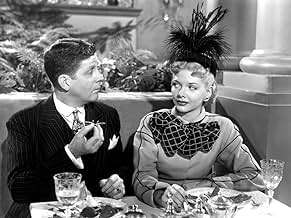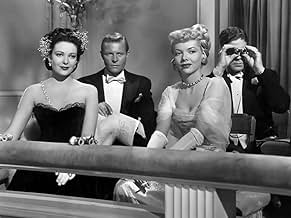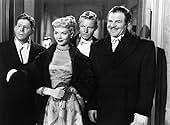IMDb RATING
7.4/10
6.1K
YOUR RATING
A man dreams of revenge when he suspects his wife is unfaithful.A man dreams of revenge when he suspects his wife is unfaithful.A man dreams of revenge when he suspects his wife is unfaithful.
- Awards
- 1 win total
Al Bridge
- House Detective
- (as Alan Bridge)
Abdullah Abbas
- Concert Attendee
- (uncredited)
Pati Behrs
- Minor Role
- (uncredited)
George Beranger
- Maître d'hôtel
- (uncredited)
Evelyn Beresford
- Madame Pompadour
- (uncredited)
Georgia Caine
- Dowager in Concert Box
- (uncredited)
James Carlisle
- Concert Attendee
- (uncredited)
Harry Carter
- Reporter
- (uncredited)
Bill Cartledge
- Page Boy
- (uncredited)
- Director
- Writer
- All cast & crew
- Production, box office & more at IMDbPro
Featured reviews
Rex Harrison comedy in films was mostly of the tongue and mind. He is known in most of his comedic roles for the witty quips, humorous repartee and funny dialog. While there's a smattering of that here, "Unfaithfully Yours" is mostly a departure from the normal Harrison persona. Here he is very funny for his antics and the fumbling, bumbling and pratfalls. He reminds one instantly of the Three Stooges and the Marx Brothers.
Is this a dark comedy, as some think? Is it about the complications of operating modern gadgets? Is it a classical musical in some sense? No, I don't think it's any of these. It's just a straightforward comedy about the foibles and problems that marital jealousy and distrust can cause. And it takes serious pokes at such jealousy in the fantasies that Harrison has after he becomes suspicious of his wife.
That his Sir Alfred De Carter might have dark daydreams about revenge or murder is offset quickly by the humorous situations that follow. And, what person hasn't at one time or another in life fantasized about getting even with someone, even by bumping them off? But only to laugh about such thoughts later? (There may be such a near perfect person or two, but even the best of my acquaintances have had such temptations in their lives.)
A scene with complicating instructions for operating a home recorder seems just a counterpoint to Carter's fantasy about how easy and simple it would be to carry out such a dream. And, the classical music - well that is just the venue in which all of this can develop, because the thought of bumping off his wife was just as horrible to Carter as classical music seemed to Preston Sturges in real life.
How do we know that? Because his wife, Sandy, tells us in an interview with the later DVD release of the movie. She says that Sturges "hated" classical music. He couldn't stand it. She said that they went to a concert one time in which he sat through the entire two-hour program. He railed against it afterwards, and Sandy said it led to his idea for this film. He would use the classical Mozart motif as a torturous undertone for the torturous fantasies brought on by jealousy. Only the humorous foibles would return Carter, the film and the viewers to normal for a spell.
So, classical music lovers, don't take it personally, but the classical music overtone for this film was not intended as a kudos to the genre. Rather, it served as a vehicle for the clever Sturges to concoct and carry out a fanciful revenge and knocking off of his wife. It's in the several different ways and times that he tries and fails that make this movie such a very good comedy. The ending says it all.
Personally, I enjoy classical as well as most forms of music. And I thought it served the purpose Sturges intended for this film and story quite well. All of the cast are very good, but this is a Harrison vehicle all the way.
Is this a dark comedy, as some think? Is it about the complications of operating modern gadgets? Is it a classical musical in some sense? No, I don't think it's any of these. It's just a straightforward comedy about the foibles and problems that marital jealousy and distrust can cause. And it takes serious pokes at such jealousy in the fantasies that Harrison has after he becomes suspicious of his wife.
That his Sir Alfred De Carter might have dark daydreams about revenge or murder is offset quickly by the humorous situations that follow. And, what person hasn't at one time or another in life fantasized about getting even with someone, even by bumping them off? But only to laugh about such thoughts later? (There may be such a near perfect person or two, but even the best of my acquaintances have had such temptations in their lives.)
A scene with complicating instructions for operating a home recorder seems just a counterpoint to Carter's fantasy about how easy and simple it would be to carry out such a dream. And, the classical music - well that is just the venue in which all of this can develop, because the thought of bumping off his wife was just as horrible to Carter as classical music seemed to Preston Sturges in real life.
How do we know that? Because his wife, Sandy, tells us in an interview with the later DVD release of the movie. She says that Sturges "hated" classical music. He couldn't stand it. She said that they went to a concert one time in which he sat through the entire two-hour program. He railed against it afterwards, and Sandy said it led to his idea for this film. He would use the classical Mozart motif as a torturous undertone for the torturous fantasies brought on by jealousy. Only the humorous foibles would return Carter, the film and the viewers to normal for a spell.
So, classical music lovers, don't take it personally, but the classical music overtone for this film was not intended as a kudos to the genre. Rather, it served as a vehicle for the clever Sturges to concoct and carry out a fanciful revenge and knocking off of his wife. It's in the several different ways and times that he tries and fails that make this movie such a very good comedy. The ending says it all.
Personally, I enjoy classical as well as most forms of music. And I thought it served the purpose Sturges intended for this film and story quite well. All of the cast are very good, but this is a Harrison vehicle all the way.
It is rare when a film is so funny that it will give me fits of belly laughter, and Unfaithfully Yours is one of them. Rex Harrison stars as an English aristocrat and eminent conductor who, despite being madly in love with his wife (played by Linda Darnell) realizes as a result of several misunderstandings that she may be cheating on him. While he is conducting a symphony concert he comes up with three different scenarios in his head of how to deal with her alleged duplicity. Actually carrying out these plans turns out to be an entirely different matter.
Preston Sturges is always an excellent writer and director, but his quick wit and double entendres are a revelation in this film. One almost has to watch it two or three times to get every comment uttered and facial expression portrayed by our protagonist (Harrison). His delivery is superb, sometimes almost funnier than the words he is saying. Darnell and the supporting cast provide excellent straight and slapstick moments. Dudley Moore starred in a remake of this film in the 80's which was also enjoyable, but having now seen this film, I highly recommend the original over the remake. It is an hour and a half of pure delight.
--Shelly
Preston Sturges is always an excellent writer and director, but his quick wit and double entendres are a revelation in this film. One almost has to watch it two or three times to get every comment uttered and facial expression portrayed by our protagonist (Harrison). His delivery is superb, sometimes almost funnier than the words he is saying. Darnell and the supporting cast provide excellent straight and slapstick moments. Dudley Moore starred in a remake of this film in the 80's which was also enjoyable, but having now seen this film, I highly recommend the original over the remake. It is an hour and a half of pure delight.
--Shelly
Unfaithfully Yours (1948)
I've never quite loved Preston Sturges as a director or Rex Harrison as an actor, so having the two of them together here didn't bode well, and I thought I'd announce my bias. And sure enough, on this second viewing I was reminded of a kind of crisp calculation that both of them have. Sturges makes amazing movies, no question, and the best of them (Palm Beach Story is my favorite) are hilarious classics. To see this one for what it offers you might first see a classic Sturges screwball from 1941 or 1942. But even those are clinical at heart (if they have a heart), so it's a little like sipping a very dry, clean martini and getting drunk. Alone. No olives. Wit and sophistication do better in the hands of Cole Porter, somehow, but see for yourself.
Harrison the actor overcomes his harsh demeanor in a movie like My Fair Lady because the music and the style there give him some kind of liberty, but here he is supposed to be sympathetic in his demented cruelty, and I only wish him failure. He is, to be sure, plotting the death of his wife. Three times. And then the fourth, beyond the symphony podium, with its madcap bedlam. It's funny in that zany way you have to laugh at. And you will laugh.
I love classical music and like the structure of the film, but as usual with Sturges, this structure makes the whole process detached and too too clever. Sturges himself wrote the screenplay for this idea way back in 1932, and if it had been shot then, before the Hays code, before the real rise of screwball, we would have had a very different movie. But what we have here is admirable and interesting, for sure, if not the zinger it could have been with a different tilt.
I've never quite loved Preston Sturges as a director or Rex Harrison as an actor, so having the two of them together here didn't bode well, and I thought I'd announce my bias. And sure enough, on this second viewing I was reminded of a kind of crisp calculation that both of them have. Sturges makes amazing movies, no question, and the best of them (Palm Beach Story is my favorite) are hilarious classics. To see this one for what it offers you might first see a classic Sturges screwball from 1941 or 1942. But even those are clinical at heart (if they have a heart), so it's a little like sipping a very dry, clean martini and getting drunk. Alone. No olives. Wit and sophistication do better in the hands of Cole Porter, somehow, but see for yourself.
Harrison the actor overcomes his harsh demeanor in a movie like My Fair Lady because the music and the style there give him some kind of liberty, but here he is supposed to be sympathetic in his demented cruelty, and I only wish him failure. He is, to be sure, plotting the death of his wife. Three times. And then the fourth, beyond the symphony podium, with its madcap bedlam. It's funny in that zany way you have to laugh at. And you will laugh.
I love classical music and like the structure of the film, but as usual with Sturges, this structure makes the whole process detached and too too clever. Sturges himself wrote the screenplay for this idea way back in 1932, and if it had been shot then, before the Hays code, before the real rise of screwball, we would have had a very different movie. But what we have here is admirable and interesting, for sure, if not the zinger it could have been with a different tilt.
Rex Harrison is a temperamental conductor and Linda Darnell his younger, adoring wife in "Unfaithfully Yours," also starring Lionel Stander, Rudy Vallee, and Kurt Krueger. Harrison and his wife are so much in love, it's sickening. But thanks to interference from his brother-in-law (a subdued Rudy Vallee), Harrison begins to believe that while he was out of town, his beautiful wife (Darnell) was consorting with his secretary, Tony, played by blond, handsome Kurt Krueger. As he conducts the orchestra in concert that evening, Harrison imagines several scenarios - one in which he kills his wife and cleverly frames Tony for the murder; one in which he pays her off; and one where he challenges Tony to a game of Russian roulette. Of course, when he actually tries to carry them out, things don't go as he imagined.
This is a hilarious movie, with Harrison absolutely magnificent - and I might add, totally unlikable. One wonders if Darnell will stay with him once the bloom is off the rose. Lanky and sure of himself, though not particularly handsome, Harrison has a certain magnetism, not to mention a snappy way with a line. "Will I see you tonight at the concert?" Vallee asks him. "Yes!" Harrison yells. "I'm generally there on the nights when I conduct!" His last scene alone in the apartment is a scream, mainly because Harrison doesn't go for laughs but takes the whole thing very seriously and in character. Darnell is beautiful and appropriately cloying. Edgar Kennedy, as a classical music loving detective, has a wonderful scene with Harrison.
I haven't seen the remake, but I noticed its voting average is lower than the original's. I can imagine Dudley Moore being quite funny, but this role, with its arch egotism, was tailor-made for Harrison.
This is a hilarious movie, with Harrison absolutely magnificent - and I might add, totally unlikable. One wonders if Darnell will stay with him once the bloom is off the rose. Lanky and sure of himself, though not particularly handsome, Harrison has a certain magnetism, not to mention a snappy way with a line. "Will I see you tonight at the concert?" Vallee asks him. "Yes!" Harrison yells. "I'm generally there on the nights when I conduct!" His last scene alone in the apartment is a scream, mainly because Harrison doesn't go for laughs but takes the whole thing very seriously and in character. Darnell is beautiful and appropriately cloying. Edgar Kennedy, as a classical music loving detective, has a wonderful scene with Harrison.
I haven't seen the remake, but I noticed its voting average is lower than the original's. I can imagine Dudley Moore being quite funny, but this role, with its arch egotism, was tailor-made for Harrison.
This film brings us Rex Harrison already foreshadowing Professor Higgins. He tries out the arrogant, picayune, verbally acute role and is absolutely successful. The seed is planted and we, who know what is to come twenty years hence, rub our hands gleefully in anticipation of Higgins. But Linda Darnell is no Eliza. Instead, she is a loving, docile, trusting wife, already dressed as though she will be meeting the Queen and looking beautiful and so very desirable.
The dialog crackles and moves fast. Only Rex Harrison and perhaps Cary Grant could have have delivered with the wit and brio that Sturges deserved.
There are two extended slapstick scenes that should have been cut shorter.
Edgar Kennedy as a Private Eye has a couple of great scenes when he turns out to be a classical music devotee and is knowledgeably enthusiastic about Harrison's conducting.
A digression: Harrison tosses a couple of tickets to the Philharmonic concert, they are orchestra tickets a few rows from the front row. Price $3.80, designated as "Patron"' seats.
The dialog crackles and moves fast. Only Rex Harrison and perhaps Cary Grant could have have delivered with the wit and brio that Sturges deserved.
There are two extended slapstick scenes that should have been cut shorter.
Edgar Kennedy as a Private Eye has a couple of great scenes when he turns out to be a classical music devotee and is knowledgeably enthusiastic about Harrison's conducting.
A digression: Harrison tosses a couple of tickets to the Philharmonic concert, they are orchestra tickets a few rows from the front row. Price $3.80, designated as "Patron"' seats.
Did you know
- TriviaThe camera zooms to a big close-up of Sir Rex Harrison's left eye just before fading to each of Alfred De Carter's infidelity fantasies. Harrison happened to be blind in that eye, the result of childhood measles.
- GoofsThe "recording machine" Rex Harrison was trying to use in his fantasy was not a recording machine at all but a Garrard RC-100 flip-over 1938 record changer.
- Quotes
Alfred: Have you ever heard of Russian Roulette?
Daphne De Carter: Why, certainly. I used to play it all the time with my father.
Alfred: I doubt that you played Russian Roulette all the time with your father!
Daphne De Carter: Oh, I most certainly did. You play it with two decks of cards, and...
Alfred: That's Russian Bank. Russian Roulette's a very different amusement which I can only wish your father had played continuously before he had you!
- ConnectionsEdited into Myra Breckinridge (1970)
- SoundtracksFrancesca da Rimini, Opus 32
(1876) (uncredited)
Music by Pyotr Ilyich Tchaikovsky (as Peter Ilystch Tchaikowski)
Played during the opening credits, at the concert and often in the score
- How long is Unfaithfully Yours?Powered by Alexa
Details
- Release date
- Country of origin
- Official sites
- Language
- Also known as
- Unfaithfully Yours
- Filming locations
- Production company
- See more company credits at IMDbPro
- Runtime
- 1h 45m(105 min)
- Color
- Aspect ratio
- 1.33 : 1
Contribute to this page
Suggest an edit or add missing content



